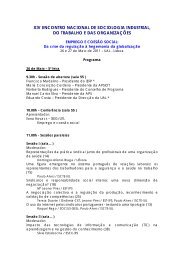Web-based Learning Solutions for Communities of Practice
Web-based Learning Solutions for Communities of Practice
Web-based Learning Solutions for Communities of Practice
Create successful ePaper yourself
Turn your PDF publications into a flip-book with our unique Google optimized e-Paper software.
A Proposed Framework <strong>for</strong> Designing Sustainable <strong>Communities</strong> <strong>for</strong> Knowledge Management Systems<br />
prospects. Journal <strong>of</strong> Computer In<strong>for</strong>mation<br />
Systems 45(4), 62-74.<br />
Cheuk, B. W. (2006). Using social networking<br />
analysis to facilitate knowledge sharing in the<br />
British Council. International Journal <strong>of</strong> Knowledge<br />
Management, 2(4), 67-76.<br />
Cohen, D. (2006). What’s your return on knowledge?<br />
Harvard Business Review, 84(12), 28-28.<br />
Constant, D., Keisler, S., & Sproull, L. (1994).<br />
What’s mine is ours, or is it? A study <strong>of</strong> attitudes<br />
about in<strong>for</strong>mation sharing. In<strong>for</strong>mation Systems<br />
Research, 5(4), 400-421.<br />
Cross, R., Laseter, T., Parker, A., & Velasquez, G.<br />
(2006). Using social network analysis to improve<br />
communities <strong>of</strong> practice. Cali<strong>for</strong>nia Management<br />
Review, 49(1), 32-60.<br />
Daconta, M., Orbst, L., & Smith, K. (2003). The<br />
semantic web. Indianapolis: Wiley Publishing.<br />
Damodaran, L., & Olphert, W. (2000). Barriers and<br />
facilitators to the use <strong>of</strong> knowledge management<br />
systems. Behavior and In<strong>for</strong>mation Technology,<br />
19(6), 405-413.<br />
Davenport, T. H., De Long, D. W., & Beers, M. C.<br />
(1997). Building successful knowledge management<br />
projects. Center <strong>for</strong> Business Innovation<br />
Working Paper, Ernst and Young.<br />
Davenport T. H., De Long, D. W., & Beers, M.<br />
C. (1998). Successful knowledge management<br />
projects. MIT Sloan Management Review, 39(2),<br />
43-57.<br />
Davenport, T. H., & Prusak, L. (1997). Working<br />
knowledge: How organizations manage what<br />
they know. Cambridge, MA: Harvard Business<br />
School Press.<br />
Davis, F. D. (1989). Perceived usefulness, perceived<br />
ease <strong>of</strong> use, and user acceptance <strong>of</strong> in<strong>for</strong>mation<br />
technology. MIS Quarterly, 13(3), 319-341.<br />
Donath, J. S. (1999). Identity and deception in<br />
the virtual community. In M. A. S. a. P. Kollock<br />
(Ed.), <strong>Communities</strong> in cyberspace (pp. 29-59)..<br />
London, Routledge.<br />
Douglas, K. M., & McGarty, C. (2001). Identifiability<br />
and self-presentation: Computer-mediated<br />
communication and intergroup interaction. British<br />
Journal <strong>of</strong> Social Psychology, 40, 399-416.<br />
Dretske, F. (1991). Explaining behavior: Reasons<br />
in a world <strong>of</strong> causes. Cambridge, MA: MIT<br />
Press.<br />
Epple, D. & Argote, L. (1996). An empirical investigation<br />
<strong>of</strong> the microstructure <strong>of</strong> knowledge<br />
acquisition and transfer through learning by doing.<br />
Operations Research, 44(1), 77-86.<br />
Faraj, S., & Wasko, M. M. (Forthcoming). The<br />
web <strong>of</strong> knowledge: An investigation <strong>of</strong> knowledge<br />
exchange in networks <strong>of</strong> practice. AMR.<br />
Garton, L., Haythornthwaite, C., & Wellman, B.<br />
(1997). Studying online social networks. Journal<br />
<strong>of</strong> Computer-Mediated Communication, 3(1),<br />
75-105.<br />
Geroimenko, V. & Chen, C. (2003). Visualizing<br />
the semantic web. London: Springer.<br />
Goel, L. & Mousavidin, E. (2007). vCRM: Virtual<br />
customer relationship management. <strong>for</strong>thcoming<br />
in DATABASE Special Issue on Virtual Worlds,<br />
November 2007.<br />
Goodhue, D. L. & Thompson, R. L. (1995). Tasktechnology<br />
fit and individual per<strong>for</strong>mance. MIS<br />
Quarterly, 19(2), 213-236.<br />
Gordon, R. & Grant, D. (2005). Knowledge<br />
management or management <strong>of</strong> knowledge? Why<br />
people interested in knowledge management need<br />
to consider foucault and the construct <strong>of</strong> power.<br />
Journal <strong>of</strong> Critical Postmodern Organization<br />
Science, 3(2), 27-38.<br />
Granovetter, M. (1973). The strength <strong>of</strong> weak ties.<br />
American Journal <strong>of</strong> Sociology, 78, 1360-1380.<br />
225



